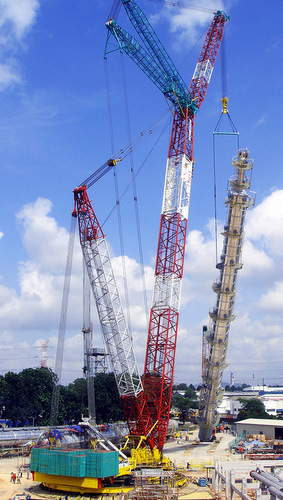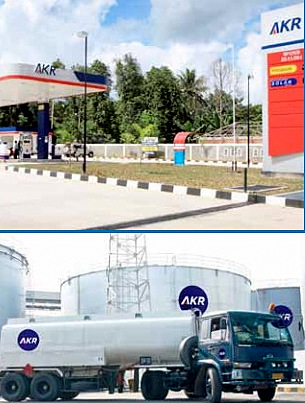This is part 2. For Part 1, click: DCG Asia Value Fund: Our Top 5 Contributors in FY2014
Top 5 Detractors
Top 5 Detractors
In the last 12 months the following five stocks have detracted from the performance of the DCG Asia Value Fund.
 Tat Hong experienced a drop in sales and profit due to the downturn in the mining and exploration sectors in Australia and Indonesia. Photo: CompanyTat Hong is the largest crane rental company in Asia. Tat Hong’s share price dropped from about S$1.20 in August 2013 to a low of S$0.72 before rebounding to over S$0.90 at end June 2014. The stock was sold down following the drop in sales and profit due to the downturn in the mining and exploration sectors in Australia and Indonesia. Overall revenue for the financial year ended March 2014 dropped 18.2% y-o-y to S$684 million while net profit plunged 53.4% to S$33 million.
Tat Hong experienced a drop in sales and profit due to the downturn in the mining and exploration sectors in Australia and Indonesia. Photo: CompanyTat Hong is the largest crane rental company in Asia. Tat Hong’s share price dropped from about S$1.20 in August 2013 to a low of S$0.72 before rebounding to over S$0.90 at end June 2014. The stock was sold down following the drop in sales and profit due to the downturn in the mining and exploration sectors in Australia and Indonesia. Overall revenue for the financial year ended March 2014 dropped 18.2% y-o-y to S$684 million while net profit plunged 53.4% to S$33 million. Contribution from Australia dropped 22% y-o-y with revenue declining across crane rental, general equipment rental and equipment distribution businesses. The crane rental division, which is the most profitable business segment and largely dependent on Australia, posted a 15.5% drop in revenue and a 4 percentage point decline in gross profit margin. In Indonesia, Tat Hong’s excavator distribution business was impacted by the weak Rupiah and declining demand from miners due to falling commodity prices and the export ban on unrefined ores.
We have sold out all our positions as fundamentals have clearly deteriorated and the outlook remains dim.
Yongnam specializes in structural steel and owns one of the largest stocks of strutting assets in Singapore. Strutts provide vital structural support for underground works to prevent the walls from collapsing inwards. We had liked the stock as its market capitalisation was already equivalent to the value of its strutting assets. However, its earnings are quite lumpy and volatile, dependent on its ability to secure new contracts.
Yongnam, being a subcontractor, was exposed to Alpine Bau, the main contractor for MRT Downtown Line 2, which incurred significant losses on the project and became insolvent. Besides, Yongnam was not able to win the Myanmar airport contract as was
Yongnam, being a subcontractor, was exposed to Alpine Bau, the main contractor for MRT Downtown Line 2, which incurred significant losses on the project and became insolvent. Besides, Yongnam was not able to win the Myanmar airport contract as was
expected. We decided to sell all our positions and switch to other better ideas.
Sinar Mas Land is a Singapore-listed property company with assets in Indonesia, Singapore, Malaysia and China. The major assets of Sinar Mas Land includes a 49.9% stake in the Jakarta-listed developer, Bumi Sepong Damai (“BSD”), 50% stake in industrial estate Kota Deltamas, 128,000 sqft of retail and office space at Orchard Tower in Singapore, and 9.5 million sqft of resort land and a 330 room, five-star hotel at Palm Resort, near Senai, Johor, Malaysia.
There were concerns about the slowing sell through rates of the properties at BSD after Bank Indonesia tightened mortgage lending last year. Since 30 September 2013, home buyers in Indonesia are required to pay a 30% down payment for the purchase of the first property of larger than 70 square meters. This goes up to 40% of the property price for the second property, and will increase to 50% for the third property purchased.
We still own the stock as we like the longer term outlook of the Indonesia property market and the shares as well as warrants continue to trade at a large discount to RNAV.
 AKR distributes subsidized fuel to retail customers through its 116 gas stations in Indonesia.
AKR distributes subsidized fuel to retail customers through its 116 gas stations in Indonesia.
Photos: CompanyAKR Corporindo (“AKR”) sells non-subsidized fuel to industrial clients and distributes subsidized fuel to retail customers through its own 116 gas stations network in Indonesia. The company recently experienced falling demand for fuel from industrial customers due to weak coal prices and new laws banning the export of unrefined ore.
For the first quarter of its financial year, consolidated sales registered only a 3.5% y-o-y growth to IDR5,630 billion mainly due to lower sales volume of petroleum. As an example, the volume of petroleum sales to Freeport Indonesia, a subsidiary of US-based Freeport McMoRan Copper & Gold, dropped 19% y-o-y due to the halting of mining activities following the export ban on copper ores and introduction of progressive tax on concentrates in January this year.
Diesel sales to the coal mining industry in Kalimantan also suffered a decline in volume as the Newcastle coal price is at its lowest since 2009.
As fuel subsidies are further reduced along with the on-going liberalization of fuel distribution in Indonesia, we believe AKR has a significant first mover advantage to increase its share of the retail fuel market. After 50 years in the petroleum and basic chemicals distribution business, AKR has built up an extensive infrastructure in ports, tank terminals and related logistic infrastructure in Indonesia, and has commenced construction of its Integrated Port and Industrial facility in East Java in 2013 as a strategic move to support the anticipated growth in logistics demand in this region.
 Prices of day-old-chicks werre capped by the government ahead of the country's elections.Malindo is a vertically integrated poultry company in Indonesia. It recently reported two consecutive weak quarters with profit margins of poultry feeds impacted by the surge in input costs following the 20% drop in Rupiah-U.S. dollar exchange rate in 3Q 2013. The 9% increase in average selling price in 4Q 2013 has partially restored feed margins.
Prices of day-old-chicks werre capped by the government ahead of the country's elections.Malindo is a vertically integrated poultry company in Indonesia. It recently reported two consecutive weak quarters with profit margins of poultry feeds impacted by the surge in input costs following the 20% drop in Rupiah-U.S. dollar exchange rate in 3Q 2013. The 9% increase in average selling price in 4Q 2013 has partially restored feed margins.
However, the group’s day-old-chick (“DOC”) business was affected by the Indonesian regulator’s surprise decision to impose price caps on DOC selling price since March 2014 as part of its effort to control inflation before the country’s elections in July 2014. Prices of poultry stocks in Indonesia, and Malindo Feedmill’s in particular, has corrected 20-30% since 4Q 2013.
Despite this short-term setback, we believe demand for poultry in the most populous country in Southeast Asia will continue to grow strongly in the coming years on the back of the growing disposable incomes and rising meat consumption of Indonesia’s growing middle class.
The information and materials contained in or accessed through this website are provided on an "as is" and "as available" basis and are of a general nature which have not been verified, considered or assessed by DCG Captital Pte. Ltd. ("DCG") in relation to the making of any specific investment, business, financial or commercial decision. Such information and materials are provided for general information only and you should seek professional advice at all times and obtain independent verification of the information and materials contained herein before making any decision based on any such information or materials.
DCG does not warrant the truth, accuracy, adequacy, completeness or reasonableness of the information and materials contained in or accessed through this website and expressly disclaims liability for any errors in, or omissions from, such information and materials. No warranty of any kind, implied, express or statutory (including but not limited to, warranties of title, merchantability, satisfactory quality, non-infringement of third-party intellectual property rights, fitness for a particular purpose and freedom from computer virus and other malicious code), is given in conjunction with such information and materials, or this website in general.
The views expressed are opinions of DCG and are subject to change based on market and other conditions. These views are not intended to be a forecast of future events, a guarantee of future results or investment advice. Nothing in this website constitutes accounting, legal, regulatory, tax or other advice.
Under no circumstances shall DCG be liable regardless of the form of action for any failure of performance, system, server or connection failure, error, omission, interruption, breach of security, computer virus, malicious code, corruption, delay in operation or transmission, transmission error or unavailability of access in connection with your accessing this website and/or using the online services even if DCG had been advised as to the possibility.
In no event shall DCG be liable to you or any other party for any damages, losses, expenses or costs whatsoever (including without limitation, any direct, indirect, special, incidental or consequential damages, loss of profits or loss opportunity) arising in connection with your use of this website, or reliance on any information, materials or online services provided at this website, regardless of the form of action and even if DCG had been advised as to the possibility of such damages.
DCG Capital Pte Ltd is a Registered Fund Management Company as defined in the Securities and Futures Act of Singapore ("SFA"). Accordingly, each client of DCG Capital Pte Ltd must be a qualified investor or accredited investor as defined under the Securities and Futures Act of Singapore (Cap. 289).
There were concerns about the slowing sell through rates of the properties at BSD after Bank Indonesia tightened mortgage lending last year. Since 30 September 2013, home buyers in Indonesia are required to pay a 30% down payment for the purchase of the first property of larger than 70 square meters. This goes up to 40% of the property price for the second property, and will increase to 50% for the third property purchased.
We still own the stock as we like the longer term outlook of the Indonesia property market and the shares as well as warrants continue to trade at a large discount to RNAV.
 AKR distributes subsidized fuel to retail customers through its 116 gas stations in Indonesia.
AKR distributes subsidized fuel to retail customers through its 116 gas stations in Indonesia. Photos: CompanyAKR Corporindo (“AKR”) sells non-subsidized fuel to industrial clients and distributes subsidized fuel to retail customers through its own 116 gas stations network in Indonesia. The company recently experienced falling demand for fuel from industrial customers due to weak coal prices and new laws banning the export of unrefined ore.
For the first quarter of its financial year, consolidated sales registered only a 3.5% y-o-y growth to IDR5,630 billion mainly due to lower sales volume of petroleum. As an example, the volume of petroleum sales to Freeport Indonesia, a subsidiary of US-based Freeport McMoRan Copper & Gold, dropped 19% y-o-y due to the halting of mining activities following the export ban on copper ores and introduction of progressive tax on concentrates in January this year.
Diesel sales to the coal mining industry in Kalimantan also suffered a decline in volume as the Newcastle coal price is at its lowest since 2009.
Subsidized fuel sales, on the other hand, saw a 114% increase in volume sales to 54,075 kiloliter from 22,196 kiloliter in 1Q13.
AKR is the only publicly listed company in Indonesia with permission to distribute subsidized petroleum and has already garnered a 5% market share in this segment. For the year 2014, AKR’s allocation for subsidized fuel distribution quota is 640,000 kiloliters, which is more than double the 2013 allocated quota of 238,000 kiloliters. The company added 13 gas stations to its existing 103 outlets nationwide in 1Q14 and plans to commission a total of 132 gas stations by end of 2014.
AKR is the only publicly listed company in Indonesia with permission to distribute subsidized petroleum and has already garnered a 5% market share in this segment. For the year 2014, AKR’s allocation for subsidized fuel distribution quota is 640,000 kiloliters, which is more than double the 2013 allocated quota of 238,000 kiloliters. The company added 13 gas stations to its existing 103 outlets nationwide in 1Q14 and plans to commission a total of 132 gas stations by end of 2014.
As fuel subsidies are further reduced along with the on-going liberalization of fuel distribution in Indonesia, we believe AKR has a significant first mover advantage to increase its share of the retail fuel market. After 50 years in the petroleum and basic chemicals distribution business, AKR has built up an extensive infrastructure in ports, tank terminals and related logistic infrastructure in Indonesia, and has commenced construction of its Integrated Port and Industrial facility in East Java in 2013 as a strategic move to support the anticipated growth in logistics demand in this region.
While we are mindful about the risks of owning a thin margin, high working capital requirements business, we like AKR’s hard-to-replicate business moat in fuel distribution and logistics in Indonesia and hence decided to hold this investment.
 Prices of day-old-chicks werre capped by the government ahead of the country's elections.Malindo is a vertically integrated poultry company in Indonesia. It recently reported two consecutive weak quarters with profit margins of poultry feeds impacted by the surge in input costs following the 20% drop in Rupiah-U.S. dollar exchange rate in 3Q 2013. The 9% increase in average selling price in 4Q 2013 has partially restored feed margins.
Prices of day-old-chicks werre capped by the government ahead of the country's elections.Malindo is a vertically integrated poultry company in Indonesia. It recently reported two consecutive weak quarters with profit margins of poultry feeds impacted by the surge in input costs following the 20% drop in Rupiah-U.S. dollar exchange rate in 3Q 2013. The 9% increase in average selling price in 4Q 2013 has partially restored feed margins. However, the group’s day-old-chick (“DOC”) business was affected by the Indonesian regulator’s surprise decision to impose price caps on DOC selling price since March 2014 as part of its effort to control inflation before the country’s elections in July 2014. Prices of poultry stocks in Indonesia, and Malindo Feedmill’s in particular, has corrected 20-30% since 4Q 2013.
Despite this short-term setback, we believe demand for poultry in the most populous country in Southeast Asia will continue to grow strongly in the coming years on the back of the growing disposable incomes and rising meat consumption of Indonesia’s growing middle class.
After the price surge to the range of Rp3,600 to Rp3,800, we reduced our positions but continue to hold the stock in our portfolio.
The information and materials contained in or accessed through this website are provided on an "as is" and "as available" basis and are of a general nature which have not been verified, considered or assessed by DCG Captital Pte. Ltd. ("DCG") in relation to the making of any specific investment, business, financial or commercial decision. Such information and materials are provided for general information only and you should seek professional advice at all times and obtain independent verification of the information and materials contained herein before making any decision based on any such information or materials.
DCG does not warrant the truth, accuracy, adequacy, completeness or reasonableness of the information and materials contained in or accessed through this website and expressly disclaims liability for any errors in, or omissions from, such information and materials. No warranty of any kind, implied, express or statutory (including but not limited to, warranties of title, merchantability, satisfactory quality, non-infringement of third-party intellectual property rights, fitness for a particular purpose and freedom from computer virus and other malicious code), is given in conjunction with such information and materials, or this website in general.
The views expressed are opinions of DCG and are subject to change based on market and other conditions. These views are not intended to be a forecast of future events, a guarantee of future results or investment advice. Nothing in this website constitutes accounting, legal, regulatory, tax or other advice.
Under no circumstances shall DCG be liable regardless of the form of action for any failure of performance, system, server or connection failure, error, omission, interruption, breach of security, computer virus, malicious code, corruption, delay in operation or transmission, transmission error or unavailability of access in connection with your accessing this website and/or using the online services even if DCG had been advised as to the possibility.
In no event shall DCG be liable to you or any other party for any damages, losses, expenses or costs whatsoever (including without limitation, any direct, indirect, special, incidental or consequential damages, loss of profits or loss opportunity) arising in connection with your use of this website, or reliance on any information, materials or online services provided at this website, regardless of the form of action and even if DCG had been advised as to the possibility of such damages.
DCG Capital Pte Ltd is a Registered Fund Management Company as defined in the Securities and Futures Act of Singapore ("SFA"). Accordingly, each client of DCG Capital Pte Ltd must be a qualified investor or accredited investor as defined under the Securities and Futures Act of Singapore (Cap. 289).



